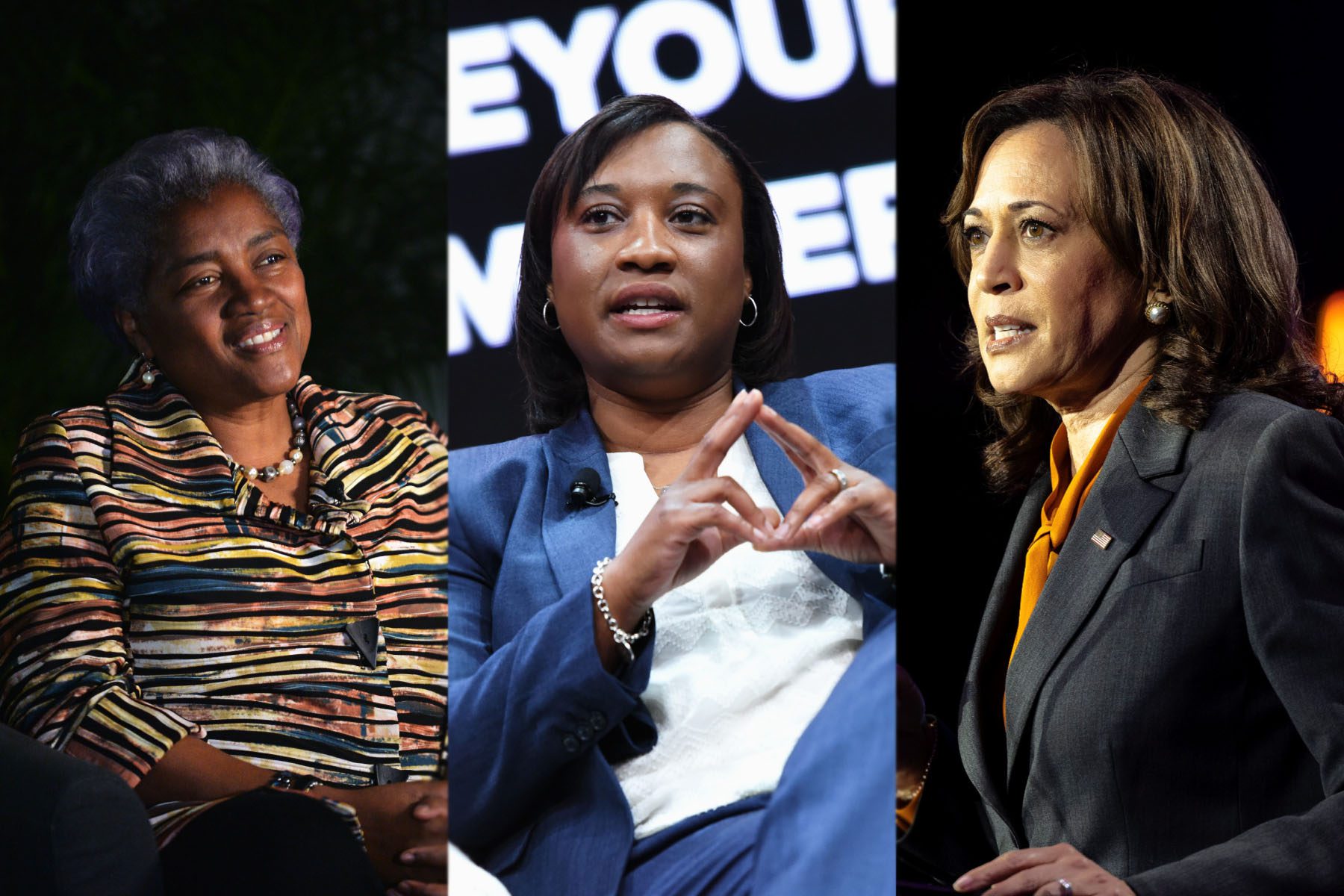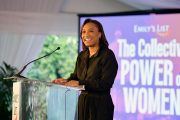In 1961, a White doctor in Mississippi gave Fannie Lou Hamer a forced hysterectomy during a surgery to remove a uterine tumor.
The procedure was so common in the state for Black women that it was known as a “Mississippi appendectomy.” Hamer’s experience thrust her into the fight for civil rights and bodily autonomy. For her, that did not include a right to abortion, something she opposed. But that connection — how a loss of ability to make her own decisions led her to larger fight for freedom – has been on my mind in the final days of the midterm election.
Issues of democracy and reproductive rights have long been tied together for women of color in America. But during this year’s midterms, women of color are in positions of power and influence in ways they haven’t been before. They framed the stakes of the election early and have made this the central argument in the final days of the campaign.
Vice President Kamala Harris is at the head of the chorus, but her voice has been echoed by the leaders of Planned Parenthood for America, NARAL Pro-Choice America and Emily’s List — all led by women of color for the first time simultaneously and in the first election cycle since the Supreme Court struck down federal protections for abortion.
In the weeks since the Dobbs v. Jackson Women’s Health Center decision — a case that originated in Mississippi, where maternal mortality rates, especially for Black women, are among the highest in the country — I have written about these women and their efforts separately. But with 11 days to go until Election Day, as they continue to fan out across the country with this message, I wanted to ask them about what they knew before much of the rest of America about what this moment means, and why it matters that they are speaking with discipline and clarity and in unison.
“Intersectionality is something that we’ve understood from Day One,” said veteran Democratic strategist Donna Brazile. “As Black women, we never had the luxury of picking and choosing what issue mattered most to us. They’re all connected, in terms of our daily lives.”
The day after Politico published a leaked draft of the Dobbs opinion, Harris delivered a fiery speech at the gala for Emily’s List, which backs Democratic women who support abortion access as they run for office, rallying an applauding crowd seven weeks before the ruling would become official.
“Women’s issues are America’s issues, and democracies cannot be strong if the rights of women are under attack,” Harris said at the May 3 event. “So to all here I say, let us fight for our country and the principles upon which it was founded, and let us fight with everything we have got.”
During the midterms, Emily’s List President Laphonza Butler announced an organizational rebrand that emphasizes voting rights alongside abortion. It’s a strategy that mirrors the vice president’s efforts.
Harris is “giving voice to the Black women in the Democratic Party who for so long have been called its backbone,” said Butler, the first Black president in Emily’s List’s nearly 40-year history. “What we are trying to say is, ‘We see you. We hear you. We stand with you.’”
Since May, Harris has campaigned and held more than three dozen virtual and in-person events around abortion, meeting with activists, health care workers, faith leaders, state attorneys general, tech and legal experts, and reproductive rights leaders. The listening sessions have helped inform her messaging on the campaign trail tying rights at the ballot box to freedoms including bodily autonomy, but also created a level of trust and a safe space, said Mini Timmaraju, who is Indian American and was named the first woman of color to head NARAL Pro-Choice America almost a year ago.
“The vice president is the convener and the person to help us connect the dots, publicly and privately,” said Timmaraju, who recently shared a stage with Harris at an event in Austin. “As leaders of color around her, we serve as amplification and validation for her as well. For each of us to be saying these things has a lot more credibility.”
Long before the Dobbs decision, Black women were having conversations about the courts, democracy, ballot access and reproductive freedom — which is why Harris was ready to meet the moment and lead, and why she and her colleagues are in lockstep, said Fatima Goss Graves, whose work as CEO of the National Women’s Law Center often sits at this intersection. But when Graves took over as head of the organization in 2017, she had far fewer Black women as peers.
“Every once in a while, I look around and I see the different voices and the women who are leading right now … it gives me great comfort knowing that, from all of these different perches, you are hearing an unwavering commitment to justice, freedom and democracy from someone who has the experience of being a Black woman,” Graves said.
“To have that voice from the vice president leading the way with such clarity, you can’t help but pause occasionally and wonder what if her voice wasn’t there?” Graves continued. “This question this year for this country is what sort of future do we want? What sort of freedom do we get to have?”
Three years before her historic bid as the first Black woman to run for a major party’s nomination to be president of the United States, Shirley Chisholm was the honorary co-president of NARAL. In 1989, dozens of Black women leaders including Chisholm, Brazile, Eleanor Holmes Norton and Maxine Waters issued a pamphlet, “We Remember: African American Women Are for Reproductive Freedom.” The short manifesto was a response to the Supreme Court’s ruling in Webster v. Reproductive Health Services, which let states impose funding restrictions on abortions, something that was assumed to be prohibited under Roe.
“It’s one of the proudest things I’ve ever done in my life,” Brazile said. “We were standing in our power. This was a galvanizing moment.”
Last fall, Brazile found a copy of the pamphlet, autographed by Dorothy Height, Coretta Scott King and Rosa Parks. She began circulating it to abortion access advocates and donors across the country and started talking to Black women months before the Dobbs decision. The words are familiar more than a generation later.
-
More from The 19th
- Abortion isn’t the top voting issue for most Americans. It’s still motivating them to turn out.
- ‘They see that it’s really in our hands now’: Young women work to get out the vote in the wake of Dobbs
- The midterms are weeks away, and the largest voting demographic is still undecided
“Choice is the essence of freedom. It’s what we African-Americans have struggled for all these years,” the pamphlet reads. “This freedom — to choose and to exercise our choices — is what we’ve fought and died for. Somebody prevented us from voting. … Now once again somebody is trying to say that we can’t handle the freedom of choice.”
The pamphlet’s words were republished in an ad in The New York Times earlier this year, paid for by the National Birth Equity Collaborative. Butler said it is this blueprint that guides a lot of the present-day message.
“We listen to the folks who raised us,” Butler said. “Our experience as women of color has helped to shape and inform how we connect what voters live and believe. We’re just giving that back to them.”
These leaders, who inherited legacy organizations that had previously been led by only White women, are crisscrossing the country in the final days leading up to the election, say it’s also a message that is resonating with voters who don’t share their lived experience, including men, young voters and conservative women.
“We do have an opportunity to broaden the coalition,” said Timmaraju. “Now it’s crystal clear that it’s about freedom from government interference. Now, freedom means something else.”
It’s a sign that representation matters, Butler said.
“The mission has not changed,” she said. “Who is in the seat can give voice to so many more nuances that are important to voters who, for many years before, may not have felt like these organizations represented them.”
The fights over both voting rights and abortion access divide along partisan lines in today’s politics, with Democrats supporting expansions and Republicans pushing for restrictions. And the national environment is not friendly for Democrats, though they hope anger over both these issues helps galvanize their voters.
The groups these women lead have pledged to spend $150 million on the midterms, and in the closing days of the campaign, they’re appearing together in key states including Nevada and Michigan.
If the case for rights — at the ballot box, for control over one’s bodies — is a winning message in November, Democrats will largely have women of color to thank. Victory could be keeping the House and the Senate and some key governor’s mansions. Victory could also look like limiting losses in Congress and statewide offices, as well as key state legislatures, preventing GOP supermajorities in states like North Carolina where they could override a governor’s veto of new restrictions.
“The solution to this moment is not just fixing the problem of Dobbs,” said Graves. “Dobbs is an alarm, but we should all care about fixing our democracy or none of us win. And the clarity Black women have across this movement is really exciting.”
Because freedom and rights have never been guaranteed for women who look like them, the work has never been about one election cycle, one court decision or one legislative battle. It may be one of the lessons of these midterms and this moment: that the process of democracy is a long game.








